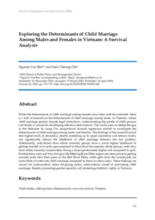While the determinants of child marriage among females have been well-documented, there is a lack of research on the determinants of child marriage among males. In Vietnam, where child marriage persists despite legal restrictions, understanding the profile of child grooms and brides is crucial for developing effective interventions.
This study aims to bridge the gap in the literature by using Cox proportional hazards regression models to investigate the determinants of child marriage among males and females. The findings of this research reveal that higher levels of education, ideally extending up to upper secondary and tertiary levels, can significantly reduce the likelihood of child marriage between the two genders. Additionally, individuals from ethnic minority groups have a much higher likelihood of getting married at an early age compared to those from the majority ethnic groups, with boys from ethnic minority communities facing a disproportionately higher risk compared to girls.
Furthermore, men and boys living in the Mekong River Delta region are more prone to getting married early than their peers in the Red River Delta, while girls from the countryside are more likely to enter into child marriage compared to those in urban areas. These findings are crucial for policymakers when designing policy interventions aimed at preventing child marriage, thereby promoting gender equality and protecting children's rights in Vietnam.

